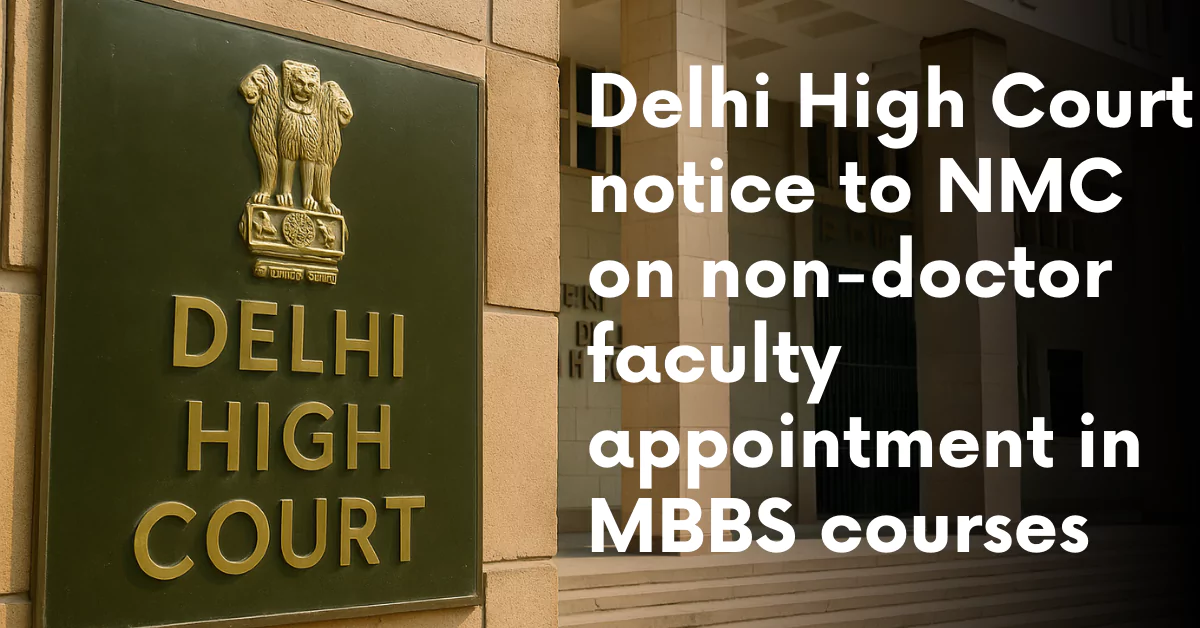NEW DELHI: The Delhi High Court has issued a notice to the National Medical Commission (NMC) over a controversial notification allowing the appointment of non-doctor faculty in medical colleges. The notice came in response to a petition filed by the United Doctors Front (UDF), which has strongly opposed the move.
What is the Case About?
Recently, NMC has allowed MSc/PhD as 30% of faculty in 5 medical subjects, such as Anatomy, Physiology, Biochemistry, Microbiology, and Pharmacology, to be non-doctors. These could include individuals with M.Sc. or Ph.D. qualifications in the respective subjects, even if they are not medically trained doctors.
The petition filed by UDF challenges this notification and argues that it will weaken the standards of medical education in India. According to the petitioners, MBBS students should be taught only by medically qualified professionals, such as MBBS, MD, or MS degree holders, and not by non-clinical degree holders.
Arguments by the Petitioners
Advocate Satyam Singh Rajput, representing UDF, argued that the NMC’s notification directly impacts the quality of medical education and could harm the career prospects of trained doctors.
The petition states that:
- Comparing MBBS/MD/MS doctors with non-doctor MSc/PhD faculty is unfair.
- The move undermines the competency-based medical education (CBME) system introduced in India.
- Allowing non-doctors to teach MBBS students dilutes the professional training required to become a doctor.
Constitutional Concerns
The petitioners also raised constitutional issues, arguing that the notification violates Article 14 (Right to Equality) and Article 21 (Right to Life) of the Indian Constitution. They claim that if non-medical faculty members teach MBBS students, it could indirectly affect the fundamental right to health of the public.
Furthermore, they highlighted that the NMC Act, 2019, was intended to raise medical education standards, not dilute them. Permitting non-doctor faculty goes against the spirit of this law.
Court’s Response
The Delhi High Court bench note of the matter and issued a notice to the NMC. The Court will hear the case in detail in the coming days.
The judges observed that the issue directly affects not just the careers of medical graduates but also the larger question of maintaining quality in India’s healthcare system.
Why the Issue Matters
Medical education plays a crucial role in shaping the country’s healthcare standards. If MBBS students are trained by non-doctor faculty, experts argue, they may not receive the same depth of clinical perspective as when taught by experienced medical professionals.
Doctors’ associations fear that this decision could reduce opportunities for qualified doctors to join teaching positions and may ultimately affect patient care standards.
Read Also: India’s Medical Education Revolution: NMC Reforms, CBME, NEXT & More
Petitioners’ Demand
The petitioners have urged the Court to order that only medically qualified MBBS/MD/MS doctors should be appointed as faculty for MBBS courses. They believe this is the only way to ensure that:
- The quality of medical education remains intact.
- The career opportunities of doctors are protected.
- The fundamental right to health of citizens is safeguarded.
The Delhi High Court’s intervention has brought the focus to medical education standards in India. While NMC’s move was intended to fill faculty shortages, the strong opposition from the medical fraternity highlights concerns about compromising education quality.
The Court’s final decision will have a significant impact on both medical students and the future of healthcare in India.

